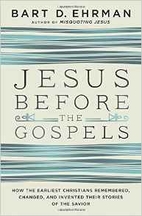I don’t often encounter two scholars of diametrically opposing viewpoints each citing the same experimental case study to support their respective conclusions. But it has happened in two very similar books about memory studies and the gospels, one by the agnostic Bart Ehrman and the other by the Christian Robert McIver.
 Here is Bart Ehrman referencing Ulric Neisser‘s study of John Dean‘s testimony against President Nixon at the time of the Watergate scandal in order to support his own argument that eyewitness memories can be pretty shocking.
Here is Bart Ehrman referencing Ulric Neisser‘s study of John Dean‘s testimony against President Nixon at the time of the Watergate scandal in order to support his own argument that eyewitness memories can be pretty shocking.
A famous example can demonstrate my point. There is a much-cited study [link is to PDF] done of both detailed and gist memories of a person who claimed to have, and was generally conceded to have, a very good memory: John Dean, White House counsel to Richard Nixon from July 1970 to April 1973.
During the Watergate hearings Dean testified in detail about dozens of specific conversations he had during the White House cover-up. In the course of the hearings he was asked how he could possibly remember such things. He claimed to have a good memory in general. But he also indicated that he had used later newspaper clippings about events in the White House to refresh his memory and to place himself back in the context of the events that were described. It was after he publicly described his conversations with Nixon that the White House tapes were discovered. With this new evidence of what was actually said on each occasion, one could look carefully at what Dean had earlier remembered as having been said, to see if he recalled both the gist and the details correctly.
That’s exactly what the previously mentioned Ulric Neisser did, in an intriguing article called “John Dean’s Memory: A Case Study.” Neisser examined two specific conversations that took place in the Oval Office, one on September 15, 1972, and the other on March 21, 1973, by comparing the transcript of Dean’s testimony with the actual recordings of the conversations. The findings were striking. Even when he was not elevating his own role and position (as he did), Dean got things wrong. Lots of things wrong. Even big things. Continue reading “Beware Memory Scholars Citing Case Studies”
